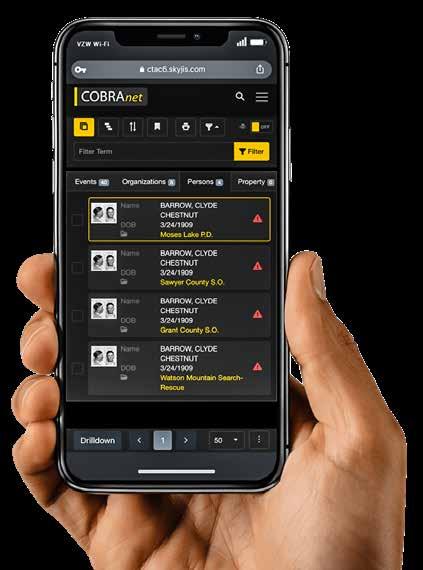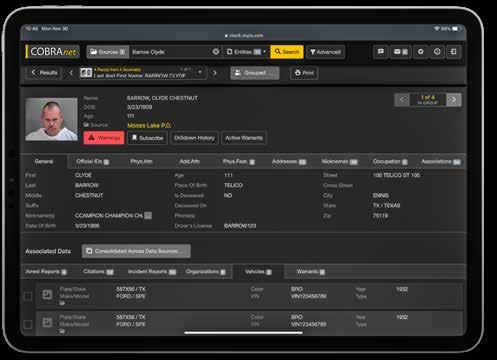
8 minute read
PA Capital Area: A Bring Your Own System Approach to Data Sharing
By: Myles Tillotson, freelance author for police and public-safety
The Capital Area Police Exchange (CAPE) affords 33 agencies real-time unified search and sharing across their diverse Records Management System (RMS) platforms. This article explores a unique approach adopted by Dauphin and Cumberland Counties that allows contributing agencies to share data, regardless of the RMS system they use at the agency.
Advertisement
Almost a decade ago, the Dauphin County selected a common RMS platform to allow participating agencies to share summary master index information with each other and the DA’s Office. However, as several departments transitioned away from the common RMS to other RMS platforms that better met their respective needs, they grew concerned about the future of their data-sharing capabilities. “We questioned how we could maintain and improve our information sharing if we weren’t on the same RMS,” said Chief Garth Warner of the Derry Township Police Department. “We couldn’t lose the ability to search county-wide. One key piece of information from another RMS can break a case.”
With agencies jumping ship off of the common RMS, a new approach to sharing was needed. This also presented the perfect opportunity to expand their data sharing beyond just summary master index information and beyond county lines across the Capital region. Dave Holl, Director of Public Safety for Lower Allen Township, appreciates the value of a multi-county information sharing consortium. “The more data the better”, he says. “It helps us all to work smarter, not harder, especially during a pandemic.”
The Dauphin County DA’s Office agreed.. According to Catharine Kilgore, the Administrator of the Dauphin County Criminal Justice Advisory Board, “it was imperative to improve the county-wide data gathering and advanced crime statistical analysis capabilities” for the DA’s staff and participating departments.
COBRAnet: Bring Your Own System Data Sharing
Representatives of the DA’s Office and police chiefs associations in Dauphin and Cumberland joined to find a solution. The leadership team, including Garth Warner, Catharine Kilgore and Dave Holl didn’t have to look far. A data-sharing platform called COBRAnet, deployed by CODY Systems, was already being used by counties across PA oo seamlessly share data across different RMS, CAD, JMS and similar platforms. Not only did COBRAnet clearly meet the team’s technical requirements but it was also already hosted and supported by Dauphin County as a regional data sharing pilot funded initially through a Federal Homeland Security grant. The idea for expanding the regional pilot to serve as the new information sharing platform came from the Dauphin County DA’s Office. For Catharine Kilgore, “it was important for us to give each police department flexibility to choose the RMS best for its needs while giving us the ability to analyze and map incidents across the county to support data-driven predictive policing.” Plus, COBRAnet also afforded participation in a broader information sharing network called PA SuperCOBRA. This network currently links more than 225 police departments in 16 counties across the Commonwealth providing a real-time, unified, statewide crime picture. The COBRAnet search app, accessible from virtually any desktop, tablet or smartphone, provides authorized users instant search access across the data from all participating agencies. The platform allows each agency full control over what information to share and what users are able to see.
Ownership, Trust and Governance: The Keys to CAPE Success
A primary challenge facing the leadership team – and the key to long-term success – was creating and maintaining a strong sense of ownership among participating agencies. The team started by choosing a name to encourage participation across the capital

A primary challenge facing the leadership team – and the key to long-term success – was creating and maintaining a strong sense of ownership among participating agencies. The team started by choosing a name to encourage participation across the capital region -and thus was born the Capital Area Police Exchange or CAPE.

region -and thus was born the Capital Area Police Exchange or CAPE. Today CAPE includes thirty-three agencies from four counties, including the City of Harrisburg, the Commonwealth capital. However, they all agreed that fostering ownership extended far beyond the name. One initial and crucial component to establishing a sense of ownership was the formation of the CAPE Users Group, comprised of experienced and enthusiastic end users. The group meets consistently to capture and promote success stories, best practices and identify potential improvements and new features. “At the County level we can talk about what we want, but what really matters is that CAPE gives the police what they need in real-time,” Kilgore says. Garth, Catharine and Dave all agreed that creating and maintaining ownership are consistent, on-going endeavors that rely on three common themes: • Building Trust • Establishing Governance and Securing Long-Term
Commitment • Promoting Success
Software Built to Build Trust
Chief Garth Warner emphasizes how important building trust is to any cross-agency information sharing relationship. The trust that has grown across the CAPE agencies has been a direct result of the confidence the agencies have in both the control and security of their data within the larger sharing network. Each participating agency decides what information it wants to share and what level of user in other agencies can see that information. “We initially granted access to our chief detective and one other user. Our use was limited, and we restricted access to information such as case narratives.” But, he continued, “As we began to see how valuable information from other agencies can be and how secure COBRAnet is, we realized we should share more information, like case narratives” he notes. The more information is shared, the more valuable CAPE is for all.
His advice to counties or agencies just starting to share through COBRAnet is to “see how it’s used and then tailor it to what you’re comfortable with. Starting out restricting some information and easing into it is easy with the COBRAnet platform.”
However, he believes agencies quickly see how valuable the information is, especially in context of the statewide search capability CAPE offers as a SuperCOBRA node. CAPE users can easily define the parameters of a specific search, from a single participating agency to the entire CAPE network, or to any or all of the agencies’ data linked through SuperCOBRA. Chief Warner adds that confidence about data security is the other essential ingredient to building trust. CAPE requires CJIS-compliant two-factor authentication at log on. This security feature built into the COBRAnet framework ensures that only authorized users have access and only at defined levels.
Establishing Governance & Securing Long-Term Commitment
For any sharing consortium, establishing a set of sharing guidelines is an absolute must. Kilgore manages the memorandum of understanding (MOU) negotiated with each agency specifying requirements for authorizing users and handling information. However, she also recognizes that a broader governance responsibility at the chief level is essential for long-term success. “Strong leadership at that level is crucial for long-term sustainment.”
Achieving such success required incorporating management and oversight of the system into existing standard operating procedures. The standing RMS subcommittees to the chiefs’ associations in Dauphin and Cumberland counties have taken an active role in governance. CAPE is on the regular agenda at chiefs meetings, raising its profile and building ownership and commitment.
“CAPE is successful,” Kilgore says, “but as with any successful project, we have to continue to highlight the value to sustain and expand that success.”
Promoting Success
For other information sharing initiatives to similarly succeed, Dave Holl believes it’s critical to quantify and document the actual benefit of the shared information. “No one’s going to pay for something unless they truly understand the benefit.” To recruit potential new agencies to CAPE and to sustain buy-in among existing ones means stressing how it can help officers in the field, not just the detectives who were the pilot’s initial users. “You have to constantly be a ‘missionary,’” Holl says, “and always reinforce the benefits.” In addition to CAPE’s impact on the quality of information available to detectives and field officers, Holl emphasizes its labor efficiency benefits. “If I assign someone a case and he has to make 20 phone calls or field visits, there’s a time and cost factor. With CAPE we can potentially reduce that by 80-90%. This is the kind of benefit that chiefs and agencies need to understand.” Holl highlights two strategies for reinforcing the value of a data sharing initiative that have worked for the CAPE and its COBRAnet deployment. First, “internal monitoring by command staff must occur,” he maintains. “If you review a case in which an officer didn’t use CAPE to save time or optimize results, you need to learn why and reinforce the importance of doing so.” Second, beyond reinforcing the benefits to individual users, it’s crucial to spread the word. Building enthusiasm for something that works as well as CAPE is “simply a marketing process.” Holl says. Once folks see what the CAPE does, the system sells itself. Holl emphasizes the importance of success stories in creating the viral buzz to encourage even more use, and to ensure CAPE has the visibility at the Chief level necessary for its long-term support. “There have been countless success stories with the system,” he says. As with every successful project, the steps taken to build trust, establish governance and promote success continue to be refined, and are always ongoing. The Pennsylvania Capital Police recently became the 33rd agency to join CAPE.
Join the COBRA Movement
Dave Holl urges: "Get on board. The more data we can share, the more effective we can all be”. Your agency doesn’t have to be in the Capital Region to realize the benefit of SuperCOBRA and have access to statewide information CAPE users enjoy. Any law enforcement agency in Pennsylvania, regardless of its current RMS platform, can participate in SuperCOBRA through a CJIS-compliant, cloud-based COBRAnet network. Contact CODY at (610) 326-7476 or info@ codysytems.com to learn more.





